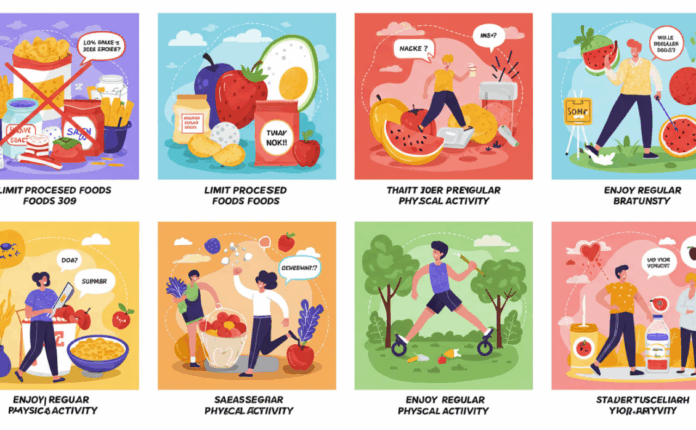In today’s fast-paced world, achieving true wellness feels like chasing a moving target. Holistic wellness offers a refreshing approach, emphasizing the interconnectedness of mind, body, and nutrition to create a balanced, fulfilling life. Unlike fleeting diet trends or intense workout fads, holistic wellness is about sustainable practices that nurture every aspect of your being. This article explores how to harmonize mental clarity, physical vitality, and nutritional balance to unlock your best self. Whether you’re a busy professional, a parent juggling responsibilities, or someone seeking a healthier lifestyle, these insights will guide you toward a more vibrant, centered you.
Understanding Holistic Wellness
What Is Holistic Wellness?
Holistic wellness is a comprehensive approach to health that considers the whole person—mind, body, and spirit—rather than focusing on isolated symptoms or goals. It’s rooted in the belief that these elements are deeply interconnected, and imbalance in one area can ripple into others. For example, chronic stress (a mental challenge) can lead to physical fatigue or poor eating habits, while proper nutrition can boost mood and energy. By addressing all three pillars—mind, body, and nutrition—holistic wellness fosters long-term health and happiness.
Why It Matters in Today’s World
Modern life often pulls us in multiple directions, leaving little time for self-care. According to a 2024 survey by the American Psychological Association, 77% of adults reported experiencing stress that impacted their physical health. Holistic wellness counters this by offering practical, integrative strategies to restore balance. It’s not about perfection but about making intentional choices that align with your unique needs, helping you thrive amidst life’s demands.
Nurturing Your Mind
The Power of Mental Clarity
Your mind is the command center of your well-being. Stress, anxiety, or lack of focus can disrupt your entire system, making mental health a cornerstone of holistic wellness. Practices like mindfulness meditation, journaling, or even simple deep-breathing exercises can significantly reduce stress. For instance, a 2023 study published in Frontiers in Psychology found that just 10 minutes of daily mindfulness practice reduced cortisol levels by 15%, improving focus and emotional resilience.
Practical Tips for Mental Wellness
Start small: dedicate five minutes each morning to a gratitude journal, noting three things you’re thankful for. This simple habit can shift your mindset toward positivity. Additionally, consider limiting screen time before bed to improve sleep quality, which directly impacts mental clarity. Apps like Headspace or Calm offer guided meditations tailored for beginners, making it easy to incorporate mindfulness into your routine. Surrounding yourself with supportive people also fosters emotional well-being, as social connections are vital for mental health.

Strengthening Your Body
Movement as Medicine
Physical activity is a pillar of holistic wellness, but it doesn’t mean you need to run marathons or lift heavy weights. The goal is to find movement that feels good and fits your lifestyle. Activities like yoga, swimming, or even brisk walking can enhance cardiovascular health, boost endorphins, and improve flexibility. The World Health Organization recommends at least 150 minutes of moderate exercise per week, which can be broken into manageable 20-minute daily sessions.
Creating a Sustainable Fitness Routine
Choose activities you enjoy to ensure consistency. For example, if you love nature, try hiking or outdoor cycling. Pairing exercise with social activities, like joining a local dance class or walking group, adds a layer of motivation and community. Incorporate strength training twice a week to maintain muscle mass and bone density, especially as you age. Apps like FitOn or Nike Training Club offer free, guided workouts for all fitness levels, making it easier to stay active without a gym membership.
Fueling with Nutrition
The Role of Balanced Nutrition
Nutrition is the fuel that powers both mind and body. A holistic approach to eating emphasizes whole, unprocessed foods that nourish without depriving. Think colorful fruits and vegetables, lean proteins, healthy fats, and complex carbohydrates. A 2024 study in The Journal of Nutrition found that diets rich in omega-3 fatty acids (found in salmon, walnuts, and flaxseeds) improved cognitive function and reduced inflammation, linking nutrition directly to mental and physical health.
Building Healthy Eating Habits
Focus on balance rather than restriction. Aim for a plate that’s half-filled with vegetables, a quarter with lean protein, and a quarter with whole grains or starchy vegetables. Hydration is equally critical—aim for at least 8 cups of water daily, adjusting for activity level and climate. Meal prepping can save time and ensure you have nutritious options on hand. For inspiration, platforms like Yummly or Minimalist Baker offer recipes that are both healthy and delicious, catering to various dietary preferences.
Integrating the Three Pillars
Creating a Holistic Routine
The magic of holistic wellness lies in integration. Start your day with a 10-minute meditation to center your mind, followed by a nutrient-packed breakfast like a smoothie with spinach, berries, and Greek yogurt. Schedule short bursts of movement, like a midday walk or evening yoga, to keep your body energized. Weekly reflection—perhaps through journaling—helps you assess what’s working and where adjustments are needed. The key is consistency, not intensity, allowing small changes to compound over time.
Overcoming Common Challenges
Time constraints and motivation are common barriers. To combat these, set realistic goals and track progress using tools like habit-tracking apps (e.g., Habitica or Streaks). If stress derails your efforts, try progressive muscle relaxation or a quick breathing exercise to reset. For nutritional hurdles, keep healthy snacks like nuts or fruit readily available to avoid reaching for processed foods. Remember, holistic wellness is a journey—small, intentional steps lead to lasting change.
The Benefits of a Holistic Approach
Adopting a holistic wellness lifestyle yields benefits that extend beyond physical health. Improved mental clarity enhances productivity and creativity, while regular movement boosts energy and confidence. Nutrient-rich eating supports everything from better skin to stronger immunity. Over time, these practices create a positive feedback loop, where feeling good motivates you to continue. A 2025 report from the Global Wellness Institute noted that individuals practicing holistic wellness reported a 20% increase in life satisfaction compared to those following conventional health routines.
Tools and Resources for Holistic Wellness
Technology can support your journey. Wearable devices like Fitbit or Apple Watch track activity and sleep, providing insights to optimize your routine. Apps like MyFitnessPal help monitor nutrition, while online communities on platforms like Reddit or Strava offer motivation and accountability. For those seeking professional guidance, certified holistic health coaches can provide personalized plans, often available virtually through platforms like Health Coach Institute.
FAQ
What is the difference between holistic wellness and traditional health approaches?
Holistic wellness focuses on the interconnectedness of mind, body, and nutrition, addressing the root causes of imbalance rather than just symptoms. Traditional health approaches often target specific issues, like weight loss or disease management, without considering the whole person.
How can beginners start with holistic wellness?
Begin with small, manageable changes: try a 5-minute meditation, add one vegetable to each meal, and walk for 10 minutes daily. Gradually build these habits into a routine that feels sustainable and enjoyable.
Do I need expensive tools or supplements for holistic wellness?
No, holistic wellness emphasizes simple, accessible practices. Whole foods, free workout apps, and basic mindfulness exercises are often enough. Supplements can be helpful but consult a healthcare provider to ensure they’re necessary.
How long does it take to see results from holistic wellness?
Results vary, but many people notice improvements in energy and mood within a few weeks. Long-term benefits, like better immunity or stress resilience, typically emerge after 2–3 months of consistent practice.
Can holistic wellness help with chronic stress?
Yes, practices like mindfulness, regular exercise, and balanced nutrition are proven to reduce stress. For example, studies show that yoga and meditation can lower cortisol levels, helping manage chronic stress effectively.




jj1zq5